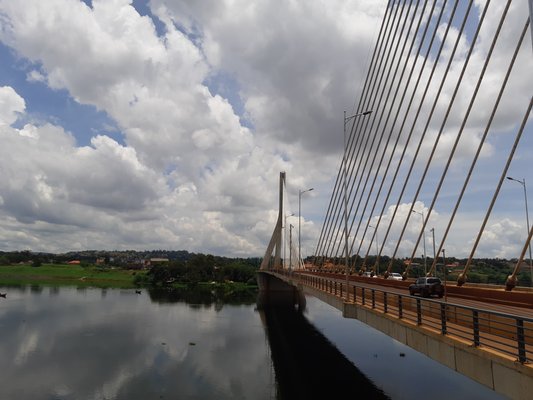A calm industrial city on the shores of Lake Victoria, at the source of the River Nile. Popular for rafting, kayaking and mountain biking along red-earth trails.
Jinja sits on the northern shores of Lake Victoria in eastern Uganda, where the Nile begins its 6,670-kilometer journey to the Mediterranean. Founded as a British administrative center in 1901, the city draws visitors with white-water rafting on the Nile, 44-meter bungee jumps, and the stone monument marking the river’s exact starting point. Walk through markets filled with hand-carved drums and textiles dyed in bold patterns, or watch fishermen cast nets near the Owen Falls Dam. Colonial-era buildings line Main Street, their iron-roofed verandas reflecting Jinja’s past as a trading post. The reconstructed Busoga Kingdom palace, with its circular thatched halls, highlights the region’s pre-colonial history.
Adventure on the Nile
White-water rafting defines Jinja’s reputation, with routes covering rapids ranging from gentle swirls to intense drops. You can choose trips tailored to different skill levels, from calm stretches near Bujagali to the churning waters around Itanda Falls. At Nile High Camp, leap from a platform suspended 44 meters above the river, feeling the spray as you rebound near the surface. Paddle a kayak along quieter sections of the Nile, or join a boat tour at dusk to spot cormorants diving for fish. Local operators organize quad bike rides through sugarcane fields and past villages where children wave from mud-brick homes.
The Nile’s Starting Point and Colonial History
A stone pillar and a statue of Mahatma Gandhi mark where the Nile flows out of Lake Victoria. Boat tours from the Source of the Nile Gardens take you to the submerged Ripon Falls, now covered by the Owen Falls Dam’s reservoir. Guides explain how the Nile’s discovery in the 19th century shaped trade routes and local communities. The gardens charge $10 for entry, with paths leading past fig trees and benches overlooking the river. Along Main Street, faded shopfronts with ornate wooden carvings reveal the influence of Indian traders who settled here during the colonial era.
Music Festivals and Markets
Each September, Discovery Beach hosts a four-day event with live performances by East African musicians, DJs, and drummers. Over 300 acts play across stages set up in the sand, attracting visitors from across Uganda and neighboring countries. At Jinja Central Market, vendors sell silver tilapia laid out on banana leaves, piles of dried chili peppers, and baskets woven from reeds. On Sundays, dancers from the Budondo Cultural Group perform near Chillington Gate, their movements synchronized with drumbeats and xylophone melodies. Catch a football match at Kakindu Stadium, where local teams play under floodlights on weekend evenings.
Getting Around and Where to Stay
Jinja is an 80-kilometer drive east of Kampala, roughly 90 minutes via the main highway. Shared minibuses called matatus leave frequently from Kampala’s Old Taxi Park, with fares around 5,000 Ugandan shillings. Motorcycle taxis known as boda-bodas zip between attractions like the Source of the Nile Gardens and the red-brick Jinja Railway Station. For lodging, choose from basic guesthouses near the market or splurge on riverside cabins at Wildwaters Lodge, perched on an island surrounded by rapids. While Jinja Airport has a runway, most travelers arrive by road.
Forests, Waterfalls, and Nearby Excursions
Mabira Forest, 50 kilometers west, spans 300 square kilometers of tropical trees teeming with hornbills and monkeys. Guided hikes follow trails past strangler figs and medicinal plants used by local communities. Near Jinja, Kyabirwa Falls offers a less crowded spot to swim or photograph the Nile’s cascades. Book a half-day fishing trip to cast lines for Nile perch, or walk along the river’s eastern bank to watch fishermen repair nets with practiced hands. Tours of the Sugar Corporation of Uganda’s plantations detail how sugarcane is harvested and processed into raw sugar.










